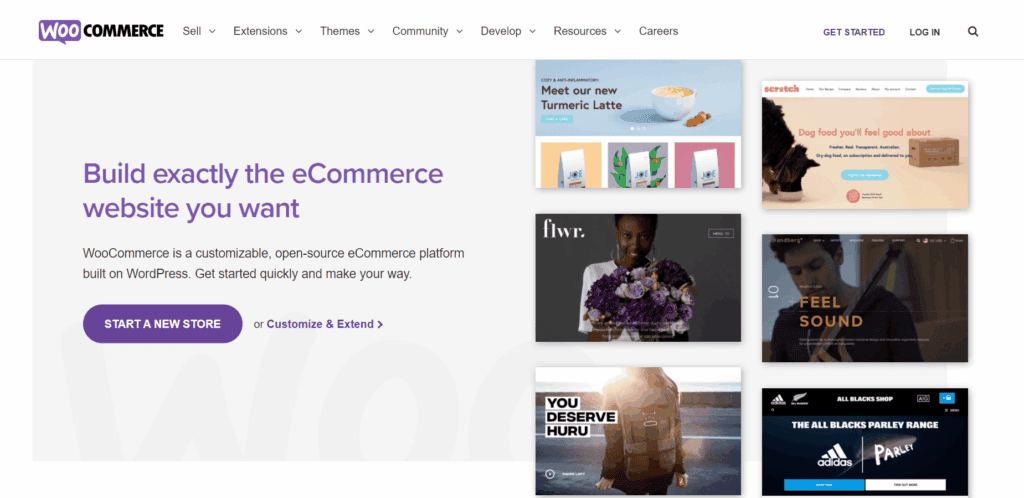[ad_1]
You’ve decided to take the plunge and start an ecommerce store. Congratulations!
However, before setting up your shop, you must know what an ecommerce platform is.
An ecommerce platform is a software solution that helps you build a website to sell products or services online. A good ecommerce platform is scalable and offers features like a shopping cart, product catalog, order management, payment processing, and shipping integration.
In short, it’s a vital piece of software for any online store!
There are a lot of different ecommerce platforms out there, and each has its pros and cons.
To help you make the best decision for your business, we’ve put together a short guide to what an ecommerce platform is and what you should look for when choosing one.
And to end with something exciting, we’ll also highlight some of the most popular platforms on the market today!
Let’s go!
An ecommerce platform: What is it?
When you hear the term ‘ecommerce platform,’ you might think of a website like Amazon or eBay.
And it definitely makes sense that you’re thinking about those two. After all, they are both very apparent platforms when shopping online.
However, Amazon and eBay are not examples of ecommerce platforms!
Amazon and eBay are actually examples of online marketplaces. While they may seem like ecommerce platforms, there are some critical differences between online marketplaces and ecommerce platforms. (We will discuss those below.)
So, what is an ecommerce platform exactly?

An ecommerce platform is simply a software solution that enables a business to sell products or services online through their own websites. In addition to hosting a website, an ecommerce platform provides tools for managing inventory, processing payments, and shipping orders.
It’s the backbone of your online store that provides you with every tool you need to seamlessly build, market, manage, and showcase your products.
In other words, an ecommerce platform helps you create both the forefront of your store and the ‘brains’ behind it, integrating parts like order, product, and customer management into a comprehensible whole.
Shopify is a popular example of an ecommerce platform. Let’s take a look at their menu items when logged into a Shopify store account:

As you can see, this ecommerce platform enables you to do things like:
- Managing and fulfilling your orders.
- Adding, editing, or removing your products.
- Looking at your store’s analytics.
- Editing the appearance of your online store.
- And much more!
There are two main types of ecommerce platforms: hosted and self-hosted.
Deciding whether to use a hosted or self-hosted ecommerce platform can be confusing. There are pros and cons to both; ultimately, it comes down to what’s best for your business.
Let’s check them out!
Hosted ecommerce platforms
A hosted ecommerce platform is a software as a service (SaaS) solution that enables businesses to create and manage their online stores.
The platform provider hosts the store on its own servers and manages all the technical aspects of running an online store, from hosting to security to payment processing.
Hosted ecommerce platforms also offer a wide range of features and integrations to help you run your store.
All you have to do is sign up and start adding your products! Of course, you will also need to focus on other aspects of the business, such as marketing and customer service.
Hosted ecommerce platforms are usually subscription-based, with businesses paying a monthly or annual fee for access to the platform. Some of the best-known hosted ecommerce platforms include Shopify and BigCommerce.

Pros
- Everything you need to get started selling online.
- It’s easy to get started for anyone.
- Includes a wide range of features and integrations designed to help you run your store.
Cons
- You are limited in terms of customization.
- You’ll have to pay a monthly fee for the platform you choose.
Self-hosted ecommerce platforms
Self-hosted platforms require you to set up your own hosting solution and manage your own website.
With a self-hosted ecommerce platform, you can influence everything from the design and layout of your website to the products you sell and the payment methods you accept.
The fact that you have complete control over your store is perhaps the most apparent advantage of self-hosted ecommerce platforms. You can always customize the look and feel of your store to match your brand!
Another significant advantage is that self-hosted platforms are often more scalable than hosted options. As your business grows, you can easily upgrade your plan to accommodate more traffic and products.
The main downside of self-hosted ecommerce platforms is that they require a certain level of technical expertise.
Self-hosted platforms are often open-source, and you will have to pay for your own hosting solution and any plugins you may need.
Some of the more popular self-hosted ecommerce platforms are WooCommerce and Adobe Commerce (Magento Open Source).

Pros
- Full control over your ecommerce store.
- Access to all your data so you can make informed decisions about your business.
- Often more scalable.
Cons
- Not beginner-friendly.
- It takes a lot of time to build an ecommerce store.
What is the difference between an ecommerce platform and an online marketplace?
Hopefully, you will feel like you have a better understanding of an ecommerce platform.
However, let’s go back to the examples of Amazon and eBay.
Why aren’t they classified as ecommerce platforms? Don’t they allow you to sell products online?
Well, yes. But, here’s the thing:
The main difference between an ecommerce platform and an online marketplace is that an ecommerce platform allows you to set up your own website, while an online marketplace is an already-existing website where you sell products amongst other retailers.
As you can see, there are over six million third-party sellers on Amazon:

Here’s an overview table of the differences between an ecommerce platform and an online marketplace:
| Ecommerce platform | Online marketplace |
| A website that sells products from a single seller. | A website that sells products from multiple sellers. |
| Pros | Cons |
| Only pay a transaction fee when a product is sold. | Pay a commission to the online marketplace for each sold item. |
| There are no other sellers on your website. | Hard to stand out from the competition. |
| Easier to build a brand. | You’re limited to the website layout of the marketplace. |
| Cons | Pros |
| It costs time and money to set up a website. | The website is already live; you just need to add your product. |
| Requires marketing to get visitors to your website. | Immediately access a large number of website visitors. |
So, which is suitable for your business?
If you’re looking to sell products online and want complete control over the customer experience, an ecommerce platform may be the best option.
However, an online marketplace may also be a great choice if you like its pros.
Ultimately, both of them can help you build a successful online business. But considering that you were interested in ecommerce platforms, let’s continue focusing on them!
8 Things to look for in an ecommerce platform

Choosing among some of the best ecommerce platforms can be a challenge.
That’s because there isn’t a single platform that’s the best for everyone. As with many things in life, the best solution depends on your exact situation.
To help you pick the right ecommerce platform for you, we’ve made a list of a few key factors you should keep in mind:
- Ease of Use. Can you easily set up your online store and add products? Are the back-end tools user-friendly?
- Scalability. Can the platform grow with your business?
- Cost. How much does the platform cost? Are there any hidden fees?
- Payment Processing. Can the platform integrate with your preferred payment gateway?
- Shipping Integration. Does the platform integrate with your preferred shipping carrier?
- Customer Support. Does the platform offer good customer support? Is it available 24/7?
- SEO Friendly. Is the platform optimized for search engines?
- Mobile Friendly. Does the platform have a mobile app or responsive design so customers can shop on their phones?
If you find an ecommerce platform that ticks all these boxes, you will know it’s a good one!
The 5 best ecommerce platforms in 2022
Doing research can be quite time-consuming, so we made a selection of five top ecommerce platforms you should check out in 2022.
Take a look at the table below for the best ecommerce platform options for you, depending on your needs!
| You need: | The best option(s) for you: |
| The best platform overall for ecommerce | Shopify or BigCommerce |
| The best SEO performance | WooCommerce |
| The platform built explicitly for dropshippers | ShopBase |
| The cheapest platform | Shift4Shop (in the US) or ShopBase |
| The platform that offers the best resources | Shopify |
| The most flexible and customizable platform | WooCommerce |
| The platform with the easiest setup for a dropshipping store | ShopBase |
Tip: Looking for an in-depth review of each platform? You will find it in this article!
FAQs about ecommerce platforms
If you have any remaining questions about ecommerce platforms, we hope to answer them here!
How much does an ecommerce platform cost?
An ecommerce platform’s costs depend on the store’s size. A basic self-hosted store can cost as little as $4 per month, while hosted ecommerce platforms like Shopify usually start at $29 per month. However, the costs can rise to $1k+ per month for large businesses.
Is it difficult to start an online store using an ecommerce platform?
Starting an online store using a self-hosted ecommerce platform can be experienced as difficult for people with little technical knowledge. However, anyone should be able to start an online store using a hosted ecommerce platform, as it isn’t difficult.
Is Amazon an ecommerce platform?
Amazon is not an ecommerce platform. Instead, it’s an online marketplace. The main difference is that there are multiple sellers on an online marketplace, while an ecommerce platform allows you to create your own online store.
Is an ecommerce platform a website?
What is the biggest ecommerce platform?
Shopify is the world’s biggest ecommerce platform, although it is closely followed by WooCommerce.
Summary
Before we go to the conclusion, we’ve created a quick summary of this article for you, so you can easily remember it:
- An ecommerce platform is a software solution designed to help you build and manage an online store.
- Hosted ecommerce platforms aim to be a beginner-friendly, all-in-one solution, while self-hosted ecommerce platforms can require a bit more technical knowledge to use.
- An ecommerce platform (like Shopify) lets you build your own website, while an online marketplace (like Amazon) is an existing website where you can list your products among other sellers.
- When looking for an ecommerce platform for your online store, Shopify, WooCommerce, and BigCommerce are some of our top picks.
Conclusion
Choosing the right ecommerce platform is crucial to the success of your online store.
There are many different options out there, so it’s essential to do your research and choose one that fits all of your business’s needs.
Hopefully, this guide has given you a better understanding of an ecommerce platform and what to look for when choosing one.
Good luck with your ecommerce store!
Want to learn more about ecommerce?
Ready to move your online store to the next level? Check out the articles below:
[ad_2]
Source link









